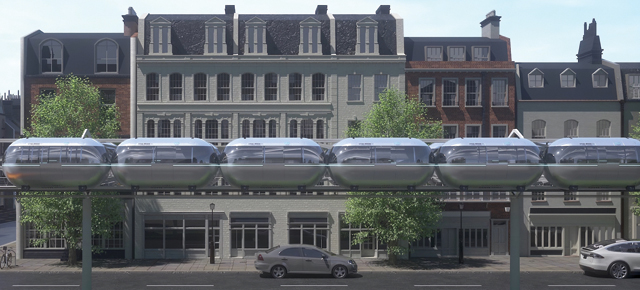World’s first operational system will open in 2025 at the National Railway Museum in Shildon, but UK-based firm plans global transport revolution

A driverless, zero-emission mass transit technology – comprising autonomous electric “pods” capable of traveling on both road and rail – launched this week by UK-start up Urban.MASS “will revolutionise urban mobility and connectivity in cities worldwide, cutting congestion, air pollution, costs and carbon emissions”.
Urban.MASS’ floc® technology promises to combine door-to-door, on-demand ride hailing transport with high frequency, accessible and sustainable mass transit to provide seamless, zero-emission passenger and cargo journeys across cities.
The world’s first fully operational site is planned to open in 2025 at the National Railway Museum, Locomotion, in Shildon, North East England – exactly 200 years after the same site hosted the world’s first passenger steam engine, Stephenson’s Locomotion. A “rapid global rollout” will follow, seeing at least 10 cities adopt the technology by 2030, beginning with Kampala, the capital of Uganda, and cities across the UK.
Explaining the concept, Urban.MASS points out that 68% of the world’s population is expected to live in urban areas by 2050, putting massive strain on roads and existing public transport networks. In the UK alone, road congestion cost the economy almost £7bn in 2019, with 65% of its workforce currently commuting by car.
The concept is billed as a cheaper alternative to conventional mass transit infrastructure projects – such as London’s £19bn Crossrail project – which are “disruptive, time consuming and costly, with European rail projects going over budget by 34% on average”. Urban.MASS says that these costs can be prohibitive for smaller cities, developers, and businesses, such as airports and out-of-town business parks, which compounds the reliance on road transport.
“Cities are changing like never before – populations are exploding but the way we move people around hasn’t changed in over a century,” said Urban.MASS CEO Kevin O’Grady. “Victorian-era rail and road technologies weren’t designed for the demands of modern life and yet worldwide we continue to rely on the same basic, expensive, and carbon intensive system. We should be using solutions of the 21st century, to serve the new breed of cities we see today – cities that are built for people, not polluting vehicles”.
It’s almost 200 years since the United Kingdom invented passenger rail – it’s time to once again set a new global precedent and upend the status quo of transport.
“It’s almost 200 years since the United Kingdom invented passenger rail – it’s time to once again set a new global precedent and upend the status quo of transport. With massive demand from cities right across the world, it’s clear that people everywhere recognise the need for a new technology to dramatically change our transport systems for the next 200 years. Our affordable and accessible system delivers twice the track for half the cost, with an unrivalled customer experience.”
The Urban.MASS floc® technology deploys hundreds of lightweight, driverless, zero emission electric pods to collect passengers from anywhere in a city using ground-level tracks or existing road networks. To traverse the most congested areas of urban centres at high speeds, the pods elevate to an above-ground Duo Rail™ track via Urban.MASS stations, all without passengers having to leave the pod. The pods can “flock” together into connected trains or run individually depending on demand. This means floc® can deliver high frequency peak capacity on dense routes and also provide economically viable services on less dense routes or during off-peak times.
The elevated Duo Rail™ track, powered by overhead solar canopies, can run above existing roads and infrastructure, giving a physical footprint 70% smaller than a typical urban light rail system. This allows infrastructure to ‘tiptoe’ through dense urban areas, minimising the need to demolish buildings or dig expensive tunnel networks, while allowing space for roads, green corridors, cycle paths or pedestrian zones below.
Using ‘pop up’ construction, each prefabricated section of Duo Rail™ track can be installed in a matter of days. The result is a system costing “50% less than traditional light rail”.
In the UK, Urban.MASS has identified a number of cities suitable for deployment, including, Bristol, Liverpool, Cambridge, Oxford, and Cardiff.
Urban.MASS has meanwhile signed partnership agreements with architectural design company Grimshaw and WSP, one of the world’s largest engineering professional services consultancies.
This article appears in the latest issue of Passenger Transport.
DON’T MISS OUT – GET YOUR COPY! – click here to subscribe!







